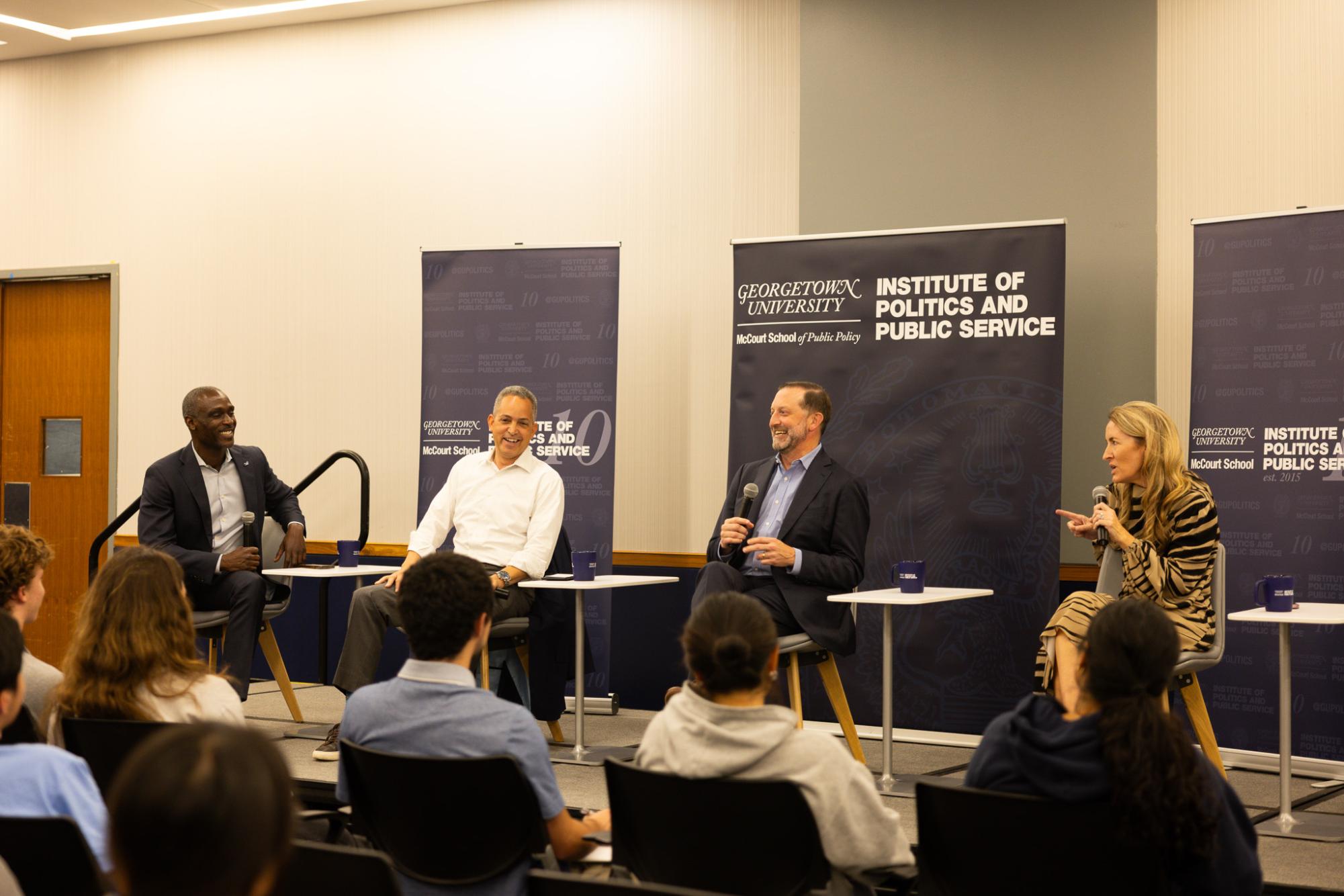Three former Georgetown University Institute of Politics and Public Service (GU Politics) fellows warned about the dangers of the government shutdown in a Sept. 30 panel, six hours before the shutdown took effect.
The former fellows — Rory Cooper, Republican strategist and former congressional communications director; Machalagh Carr, former chief of staff to former U.S. House of Representatives Speaker Kevin McCarthy; and Don Graves (LAW ’95), former deputy secretary of commerce for the Biden administration — debated how the shutdown will impact federal workers, governance and the 2026 midterm elections. Eugene Scott, a journalist for Axios and a Spring 2018 fellow, moderated the panel.

Carr said modern government shutdowns are attempts by the minority party to block funding for the majority party’s agenda.
“All government shutdowns of the modern era are one exact formula, and they do not waver,” Carr said at the event. “The party that does not have the most power tries to use a created crisis to extract something that they could not get if they had the regular mechanisms of power.”
Carr said she predicts furloughed government employees will lose their jobs, arguing that Russell Vought, director of the Office of Management and Budget (OMB), will likely follow through on a plan to fire government employees.
“I know Russ Vought, and I will tell you he’s not bluffing,” Carr said. “When he says, ‘send me your list of exempt and non-exempt,’ what he’s telling you to do is say who’s going to be fired, not who’s going to get their paycheck six weeks later.”
Vought recently suggested that the government shutdown would be an opportunity for mass layoffs. The OMB works under the direction of President Donald Trump, who touted the shutdown as a good excuse to get rid of “Democrat things.”
Carr said she thinks the promise of backpay to federal employees is insulting when many live paycheck to paycheck.
“Most federal employees live paycheck to paycheck,” Carr said. “So being told ‘Don’t worry, we passed the bill that if we shut down for six weeks, you’re going to get your paycheck at the end’ is really loud and obnoxious to hear.”
Cooper said he is not concerned by the shutdown because he expects it to end quickly, noting that previous shutdowns have not lasted for long.
“I would say that my anxiety is pretty low, and the reason for that is because I don’t think this is going to last very long,” Cooper said during the event. “The 2013 shutdown was 14 days. The one in ’19 went on for a while — but that was mostly because of the holidays. Those conferences or Democratic caucus meetings in the basement of the Capitol are going to get old fast, and so it’s going to end quickly.”
The panelists also discussed how a shutdown could impact the upcoming 2026 midterm elections, which have historically acted as referendums on current administrations.
Graves said Democrats may view the shutdown as an opportunity to garner support from their base in the face of low approval numbers.
“The base is basically punishing the Democratic party right now with historically low favorability numbers, and I think this is their means of showing that they actually have some fight,” Graves said at the event. “I don’t think that they even have to necessarily outmaneuver or win — just show that they have some fight, show that they’re going to try and stick it to the administration.”
Carr said Democrats may be miscalculating their strategy.
“The Democrats are looking at this through a historical lens of ‘Republicans always get blamed for a shutdown, so they’re going to get blamed for this shutdown, so we’re going to win,’” Carr said. “And I think they’re right — Republicans usually get blamed — but usually it’s Republicans’ fault. This time, it’s the Democrats’ fault, and so I think that we’re shutting down because there’s a political miscalculation happening.”
Graves said Democratic leaders were acting correctly and the shutdown may help them win over voters.
“I do think that the president will pay a price in the midterms as a result if things move forward and they aren’t able to prevent the loss of health care,” Graves said. “It’s also a way for the Democrats to message in a good way, on debt fiscal issues, to peel off some of the independents and fiscal conservatives who are seeing that this administration isn’t actually delivering on fiscal austerity.”
Cooper said the perception of culpability for the shutdown likely wouldn’t impact the midterms.
“Going back to 2013, Republicans did get blamed, and then the next midterms, they picked up nine seats,” Cooper said. “So who gets blamed or who doesn’t get blamed kind of becomes irrelevant.”